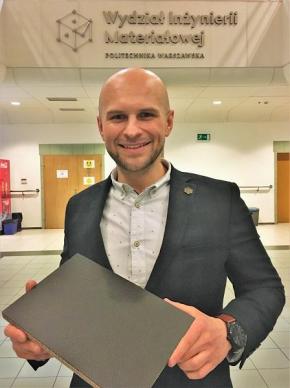A novel composite material
Requirements for composite materials used in the industry are getting ever more demanding. Companies are doing their best to gain even the slightest competitive edge and scientists are helping them to do so. Mgr inż. Kamil Dydek, a PhD student at the Warsaw University of Technology Faculty of Materials Science and Engineering is working hand in hand with his team to develop an innovative solution, which may be applied in aviation, the wind power and automobile industries and even in medicine and sports gear.
Work to enhance the properties of carbon fiber-reinforced polymer composite materials has been long underway. Attempts have been made to enrich their structure by adding carbon particles, such as graphite, graphene, soot or carbon nanotubes. The latter are especially promising, mainly due to their high electrical conductivity, very good mechanical properties, low density and a high shape coefficient.
Can such modifications be made effectively and safely? There are many ways to achieve them, but they are far from perfect. A number of problems appear, ranging from low efficiency, high manufacturing costs, increased viscosity of the polymer matrix and even health hazards.
Room for innovation
Thermoplastic acrylic resin and its modification potential are thus increasingly attracting interest. The resin boasts lower viscosity and density than the standard epoxy and polyester resins currently in use. It eliminates a range of unwelcome process effects, while at the same time still not having been thoroughly explored. This creates room for innovative ideas.
“Most current research focuses on comparing the mechanical properties and identifying the method of destruction of acrylic resin-based composites, as well as on optimizing the infusion process,” explains mgr inż. Kamil Dydek.
The structure of polymer composite materials can also be modified by adding conductive, thermoplastic non-woven materials enriched with carbon nanotubes to decrease the resistivity of the composite material and to improve its mechanical strength.
“We are taking one step forward and will be dealing with something completely innovative – we want to modify a composite material using the methods I have described,” says mgr inż. Kamil Dydek. “In this way, we will take advantage of a synergy effect to develop a material with significantly enhanced electrical and mechanical properties”.
A better material
What does it really mean? The team led by our researcher from the Faculty of Materials Science and Engineering wants to develop a composite material which will be lighter, more durable and conductive. As it will be produced by infusion, it will easily allow for manufacturing large high quality elements. An additional upside will be its recyclability, which is currently a problem affecting all the commonly used composite materials with duroplastic matrices.
“This opens up broad perspectives for the application of the new material in the constantly growing energy sector as wind turbine blades, as well as in the production of aircraft equipment or fuselage skin for the aviation sector,” says mgr inż. Kamil Dydek. “In addition, if used in the automotive industry, the lower weight of the novel composite material will translate into lower fuel consumption, and so also into reduced noxious emissions and, in the case of electric cars, into longer ranges”.
The industry says: we’re in
The final result of the project will be a demonstrator, which will then be subjected to application tests to check the commercialization potential of the solution. If it works, who knows? Maybe in a few years we will all be using things made of the WUT-made innovative composite material?
The industry is already showing interest. Nine companies have even sent letters of intent. These include NANOCYL (Belgium), PZL Mielec – Lockheed Martin Company AT-P Aviation Sp. z o.o., TMBK Partners Sp. z o.o. and Bora Yachts Sp. z o.o.
The project entitled: “Polymer composite materials with enhanced mechanical and electrical properties based on an innovative thermoplastic resin” is funded by the National Centre for Research and Development under the LIDER XI programme (project number: 0185/L-11/2019)
Principal investigator: mgr inż. Kamil Dydek
Team members: dr inż. Paulina Latko-Durałek, dr Bogna Sztorch, dr inż. Paulina Kozera, dr inż. Zuzanna Krawczyk, mgr Dariusz Brząkalski, mgr inż. Kamil Majchrowicz, mgr inż. Mariusz Nyc, inż. Szymon Demski
Project duration: January 1, 2021 to November 30, 2023


